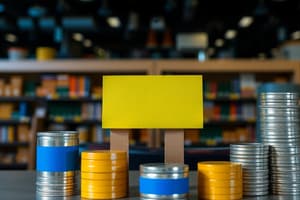Podcast
Questions and Answers
What aspect does microeconomics primarily focus on?
What aspect does microeconomics primarily focus on?
- Individual and business-level behavior (correct)
- Government intervention in markets
- Inflation rates and economic growth
- National economic policies
What is the main difference between positive and normative economics?
What is the main difference between positive and normative economics?
- Positive economics is opinion-based while normative economics is factual
- Positive economics focuses on facts, while normative economics involves value judgments (correct)
- Normative economics is rooted in statistics, while positive economics is theoretical
- Normative economics can be tested, whereas positive economics cannot
Which economist is known for introducing the law of comparative advantage?
Which economist is known for introducing the law of comparative advantage?
- Karl Marx
- David Ricardo (correct)
- Adam Smith
- John Maynard Keynes
What does the ceteris paribus rule assume?
What does the ceteris paribus rule assume?
How did Joseph Lee characterize economics based on earlier definitions?
How did Joseph Lee characterize economics based on earlier definitions?
What is the primary function of models in economics?
What is the primary function of models in economics?
Which statement best captures Alfred Marshall's definition of economics?
Which statement best captures Alfred Marshall's definition of economics?
What is primarily studied in macroeconomics?
What is primarily studied in macroeconomics?
Flashcards
Economics
Economics
The study of how people make choices when faced with scarcity, focusing on individual behavior and market forces.
Macroeconomics
Macroeconomics
The study of the economy as a whole, examining large-scale factors like inflation, unemployment, and national output.
Microeconomics
Microeconomics
The study of how individuals and businesses make choices regarding production, consumption, and resource allocation.
Ceteris Paribus
Ceteris Paribus
Signup and view all the flashcards
Normative Economics
Normative Economics
Signup and view all the flashcards
Positive Economics
Positive Economics
Signup and view all the flashcards
Economic Model
Economic Model
Signup and view all the flashcards
Induction
Induction
Signup and view all the flashcards
Study Notes
Definition of Economics
- Economics examines how real-world economies function at various levels.
- Alfred Marshall defined it as the study of human activity related to everyday life and business.
- Core issues include price control, resource allocation, and market dynamics.
Importance of Studying Economics
- Understanding significant societal changes, particularly post-industrial revolution.
- Addresses issues like inflation, joblessness, and social disparity.
- Provides individuals and policymakers with tools for informed decision-making.
Historical Development of Economics
- "Economics" traces its roots back to ancient Greek concepts of household management.
- Key economists:
- Adam Smith: Advocated limited government intervention.
- David Ricardo: Introduced the principle of comparative advantage.
- Karl Marx: Criticized capitalism, supporting socialism.
- John Maynard Keynes: Promoted government intervention during economic downturns.
Difference Between Political Economy and Economics
- Political economy merges economic thought with political and ethical considerations to analyze national wealth creation.
- Marshall's definition of economics focuses on individual behavior and market forces.
Key Definitions by Influential Economists
- Adam Smith: Economics is the study of wealth creation.
- Alfred Marshall: Economics studies human behavior in everyday economic activity.
- Lionel Robbins: Economics examines human behavior concerning scarce resources.
- John Maynard Keynes: Economics is a practical tool for developing sound conclusions.
Microeconomics vs. Macroeconomics
- Microeconomics: Examines individual and business-level decisions.
- Macroeconomics: Studies large-scale economic factors, including inflation and national output.
Methods and Models in Economics
- Economists use deduction and induction for theory development and testing.
- Models simplify real-world situations to explain or forecast economic trends.
Positive vs. Normative Economics
- Positive economics: Presents factual statements for testing.
- Normative economics: Includes value judgments and opinions.
Ceteris Paribus Rule
- This rule assumes all other variables are constant to study the relationship between economic factors.
Key Concepts
- Models, normative economics, microeconomics, positive economics, macroeconomics, ceteris paribus, induction, deduction are foundational economic ideas.
Self-Review Questions
- Exercises are available to further enhance understanding of economics concepts.
Studying That Suits You
Use AI to generate personalized quizzes and flashcards to suit your learning preferences.




